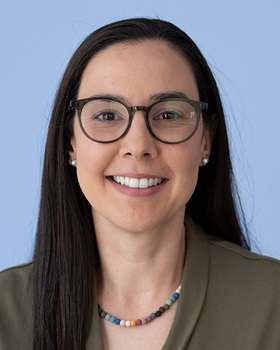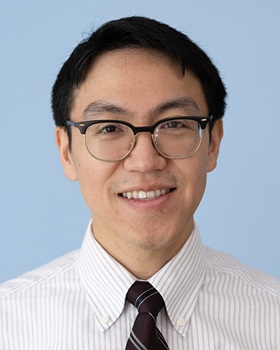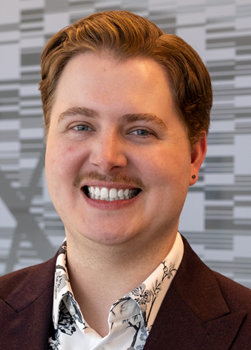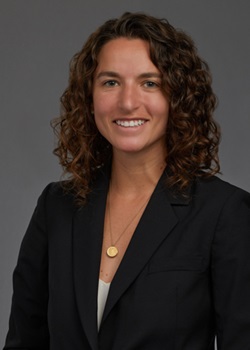Adolescent Medicine Fellowship
Adolescent Medicine Fellows
Adolescent Medicine Fellows
Adolescent Medicine Fellows
Adolescent Medicine Fellows
The University of Colorado School of Medicine (CU SOM) Department of Pediatrics and Children's Hospital Colorado (CHCO) offer a two/three-year fellowship in adolescent medicine.
The goal of our Accreditation Council of Graduate Medical Education accredited fellowship is to provide board-eligible physicians in pediatrics, internal medicine, or family medicine with in-depth training in adolescent medicine that will prepare them for a career in clinical or academic medicine.
Program Aims
- Prepare adolescent medicine fellows to deliver patient-centered and comprehensive care to adolescent patients and their families. Special emphasis is placed on developing excellent communication skills to effectively engage with and understand the unique needs of this population.
- Equip adolescent medicine fellows with the knowledge and skills to provide high-quality, evidence-based care that addresses both the acute and chronic physical and mental health needs of adolescents. This includes preparing fellows to assist adolescents in transitioning to adult care successfully.
- Offer exceptional opportunities for research and quality improvement training to adolescent medicine fellows, enabling them to become proficient in conducting impactful studies and contributing to the advancement of academic adolescent medicine.
- Establish and maintain an inclusive learning environment that promotes diversity and celebrates differences. The program aims to actively recruit fellows from diverse backgrounds and foster an atmosphere that values and respects individual perspectives, creating a rich and culturally sensitive training experience.
Adolescent Medicine Clinic
The Adolescent Medicine clinic serves as the primary referral site for the entire Rocky Mountain Region and has ~8000 patient visits a year for both primary and consultative care. Patients from a variety of socioeconomic, ethnic and cultural backgrounds present for care related to:
- Primary Care
- Unhealthy eating behaviors
- Mental and behavioral concerns
- School performance issues
- Sexual and reproductive health care
- Menstrual concerns
- Persistent fatigue
- Dysautonomia/PoTS
- Chronic illness
- Somatic Symptoms
- Diagnostic dilemmas
- Substance use disorders
Fellows serve as the primary care provider for their own patients and supervise medical students, residents, and other trainees during their fellowship while also becoming experts in consultative medicine. Fellows also participate in multiple electives throughout training (3 the second year, 4 the third year) in areas such as sports medicine, gynecology, medical education, acute inpatient for eating disorders, etc.
BC4U
As part of their fellowship, fellows rotate through our Title X-funded family planning clinic. This experience starts in their first year and continues throughout the duration of the fellowship. The fellows actively participate in this clinic, providing exceptional and cost-free services to patients. Additionally, they receive comprehensive training in Long-Acting Reversible Contraception (LARC) methods, enhancing their skills and knowledge in this area.
TRUE Center for Gender Diversity
Throughout the fellowship program, fellows receive specialized training in providing gender-diverse care for children and adolescents. This training commences in their first year with a dedicated month-long experience, and it continues throughout the entirety of their training. Fellows gain valuable skills and knowledge in delivering inclusive and comprehensive care to individuals across the gender spectrum, ensuring that they are well-prepared to address the specific needs and concerns of gender-diverse patients.
Multidisciplinary Team
Our section comprises a collaborative team of healthcare professionals, including 10 faculty physicians and 4 advanced practice providers. In addition to the medical staff, our team includes behavioral health clinicians, behavioral health and community navigators, social workers, a psychiatrist, nurses, and dietitians. This multidisciplinary approach ensures that our patients receive holistic and integrated care that addresses their physical, mental, and emotional well-being.
Formal Course Work
Fellows may enroll in formal courses offered by the Colorado School of Public Health. Although a short course in biostatistics is required for fellows, additional courses can be taken electively. Colorado School of Medicine does provide some financial support for a Master of Science degree; a Master of Public Health is also available although there is no institutional support.
Research Participation
Fellows are expected to participate in weekly section conferences, conduct, and complete one independent study that results in both presentation at a national professional meeting and in publication. Each fellow's research activities will be guided by a scholarly oversight committee of three faculty members (at least one must be from the Section of Adolescent Medicine). Fellows will also conduct a quality improvement study during their training.
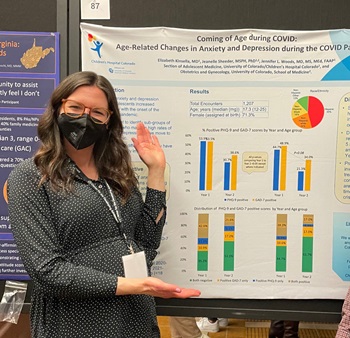
The fellowship program offers various opportunities for fellows to enhance their knowledge and professional growth.
Some of these activities include:
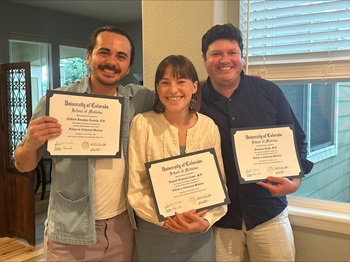
Clinical Supervision
Fellows will learn how to provide clinical supervision to medical students, residents, and other trainees. Initially, they will receive guided direction from the faculty and gradually assume full responsibility for supervising in an outpatient setting. This experience allows fellows to develop their skills in mentoring and guiding junior colleagues.
Teaching
Fellows will learn how to teach professional colleagues in small groups and lecture settings. They will have the opportunity to share their expertise and knowledge with others, contributing to the education and development of their peers. This teaching experience helps fellows refine their communication and presentation skills.
Section Conferences and Resident Didactics
Fellows are expected to actively participate in section conferences, which provide a platform for discussion and learning among the faculty and trainees. They will also contribute their insights and expertise during resident didactic sessions, enriching the educational experience for residents.
Weekly Academic Half Day
Fellows will actively participate in the weekly academic half day, which typically involves educational activities, case discussions, journal clubs, and presentations. They will contribute to the discussions and provide leadership to promote a collaborative and engaging learning environment.
Faculty Meetings
Fellows will be invited to attend Section faculty meetings, where they can actively contribute to the discussions and decision-making processes related to the fellowship program. This involvement allows fellows to gain insights into program management and administration.
Administrative Responsibilities
Fellows may be assigned administrative responsibilities, such as creating the schedule for academic half day or managing a specific programmatic component. These responsibilities provide opportunities for fellows to develop organizational and leadership skills.
Overall, the fellowship program aims to provide a comprehensive learning experience for fellows, encompassing clinical supervision, teaching, active participation in conferences and didactics, and involvement in administrative tasks. These activities contribute to the fellows' professional growth and prepare them for future leadership roles in their field.
Training schedule
| First Year | Second Year | Third Year |
|
|
|
| Fellows take call on average once a month with evening and weekend call taken from home; call is shared with the full-time faculty. | ||
Additional Learning Opportunities
Subspecialty Excellence in Educational Leadership & Scholarship (SEELS) Program
- The University of Colorado Department of Pediatrics is proud to offer the Subspecialty Excellence in Educational Leadership & Scholarship (SEELS) Program for subspecialty pediatric fellows committed to an academic career in medical education.
- The SEELS program guides fellows through an 18-month program that provides research mentorship, coaching, and instruction.
- The overall goal of SEELS is to equip these fellows with the necessary knowledge/skills/attitudes for success as future medical educators through educational scholarship and professional identity development, faculty and peer mentorship, and engaging in an educational community of practice.
Pediatric Fellowship Educational Series
This educational series has been developed by the Committee on Fellowship Education to address areas of scholarly interest common to all pediatric fellows. Nearly 100 sub-specialized physicians in training will attend 5-6 half-day seminars spread across their 3 years of fellowship.
- Attendance is mandatory and the trainee is excused from clinical responsibilities.
- In addition to providing core educational material, these sessions allow trainees in different disciplines and throughout the department to meet and interact with one another in an informal and collegial environment.
- Occurs several times per year throughout fellowship with fellows of different subspecialties
Pediatric Biostatistics for Clinicians Course
This course is primarily intended for 2nd and 3rd year Department of Pediatrics fellows as part of the comprehensive fellowship educational program. Designed to help fellows to develop an ability to be a critical consumer of the literature and develop familiarity with many commonly used statistical methods.
- This course comprises for five 2-hour sessions
- Designed for second year fellows, but any fellow or resident an register for the course.
Advanced Degrees Available at CU
The Adolescent Medicine section focuses on addressing DEI (Diversity, Equity, and Inclusion) and health disparities.
We are committed to this cause and have established ourselves as leaders in the field through various initiatives, such as hospital programs, education, and research.
Here are some key points about our work:
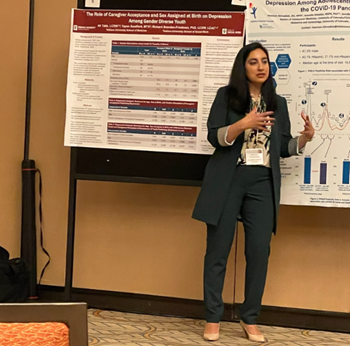
Social Determinants Screening
In our Adolescent Medicine clinic, we screen all patients to identify social determinants that may impact their health. This allows us to understand the broader context of their lives and provide comprehensive care.
Multidisciplinary Team
We have a dedicated team comprising professionals from various disciplines who collaborate to support patients and their families. This approach ensures that we address the complex needs of adolescents effectively.
DEI Training
The entire section, including faculty, fellows, and staff, actively participates in DEI trainings. These sessions cover topics such as implicit bias, teamwork, and building a more inclusive future.
- Toward Equity
- Captains of Inclusion
- External Trainings on Sexual and Reproductive Justice
Research Focus
Our research efforts concentrate on examining the influence of social determinants on mental health, the transition of care for adolescents, and issues related to disordered eating. By exploring these areas, we aim to contribute valuable insights to the field.
Good Trouble Award
The Good Trouble Award through CU Anschutz recognizes individuals who have gone beyond their role to advocate for equity and justice in healthcare and society. Our fellow, Yasaman Ahmadieh, was the inaugural trainee winner of the award.
1st Year Fellows
| Fellows | |
Nichole Anderez, DO |
|
Michael Leong, MD |
|
2nd Year Fellow
| Fellow | |
Brett Solfermoser, MD |
|
3rd Year Fellow
| Fellow | |
Courtney Franceschi, MD |
|
Dear Fellowship Candidate,
The fellowship application process for our program is similar to most adolescent fellowships, which utilizes the ERAS system to apply and the NRMP system for the match. Adolescent Medicine Fellowships participate in the July application process, starting one year preceding the anticipated start date.
*Applicants can submit their application to ERAS starting July 1st.
Fellowship programs can first view applicants on July 15th.
Interviews typically occur from mid-August through early October. Rank lists are submitted by mid-late October, with NRMP (match results) occurring the second week of November. Applicants are welcome to inquire about off-cycle start dates outside the typical application and match cycle, though priority is given to the common application process.
ERAS Application Timeline
| Date | Activity |
| Monday, May 31, 2026 | ERAS 2026 season ends at 5 p.m. ET. |
| Wednesday, June 3, 2026 | ERAS 2027 season begins at 9 a.m. ET. |
| Thursday, June 4, 2026 | EFDO will release tokens to fellowship applicants. |
| Wednesday, July 1, 2026 | July cycle fellowship applicants may begin submitting applications to programs at 9 a.m. ET. |
| Wednesday July 15, 2026 | July cycle fellowship programs may begin reviewing applications at 9 a.m. ET. |
| May 31, 2027 | ERAS 2027 season ends at 5 p.m. ET. |
NRMP Fall Match Timeline
| Dates | Activity |
| Wednesday, August 26, 2026 | Match Opens |
| Wednesday, September 30, 2026 | Ranking Opens |
| Wednesday, October 28, 2026 | Quota Change Deadline |
| Wednesday, November 18, 2026 | Rank Order List Certification Deadline |
| Wednesday, December 2, 2026 | MATCH DAY |
If you require further information about the program, please contact me anytime.
Sincerely,
Jennifer L. Woods, MD, MS, MEd, FAAP, FSAHM (she/her/hers)
Medical Director, Fellowship Director | Adolescent Medicine
Professor of Pediatrics
13123 East 16th Avenue, B025 | Aurora, CO 80045
Phone: (720) 777-8054 | [email protected]
